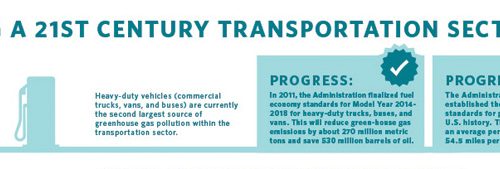The Massachusetts Institute of Technology-hosted Concrete Sustainability Hub (CSHub) released a statement last month after the White House outlined strategy to curtail greenhouse gas emissions.
President Obama’s Climate Action Plan calls for changes to our nation’s infrastructure and energy use. CSHub has been working since 2010 to actively address two of his key points.
Building a 21st century transportation sector
The U.S. transportation sector burns over 174 billion gallons of fuel each year, making up 27 percent of total greenhouse gas emissions. Strategies for improving fuel efficiency include upgrading to higher efficiency vehicles or maintaining engine efficiency and proper tire inflation—tactics that can be difficult to regulate from a policy perspective. Furthermore, outcomes from such policies may take years to realize or are challenging to account for.
CSHub research has shown that simply employing a more rigid pavement design can reduce vehicle fuel consumption by 0.1–1 percent. While this may seem minor, the impact is large when aggregated to the nation’s transportation fleet. Considering that trucks alone travel roughly 300 million miles and consume over 47 million gallons of fuel each year, leading to 425 million tons of carbon dioxide emissions, there is a potentially tremendous annual impact.

In addition, research has shown that maintaining smooth road surfaces can reduce fuel consumption significantly. Rough roads increase the resistance on a vehicle; in fact, a rough road could increase the fuel consumption of the cars by 1,000 to 30,000 gallons per mile per year depending on traffic volume, equivalent to upwards of 300 tons of CO2 per mile of road per year. Considering there are approximately 2.5 million miles of high-type paved surfaces in the U.S., the cumulative impact could also be significant. By strategically designing and maintaining our nation’s roadways, we have a lever to improve fuel efficiency without relying on vehicle fuel standards and maintenance practices.
Lowering concrete’s carbon footprint
Concrete is the most widely produced man-made material on Earth, thus it’s vital that it is manufactured in a way that minimizes the carbon footprint over the long term. CSHub is working to find new ways to produce concrete that minimize the use of energy as well as improve its longevity and durability.
